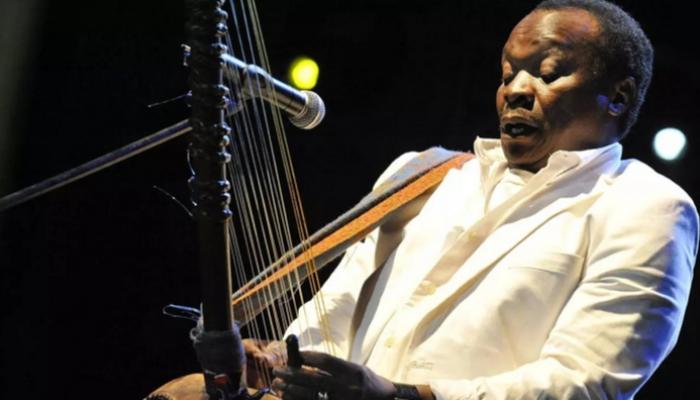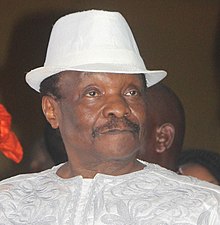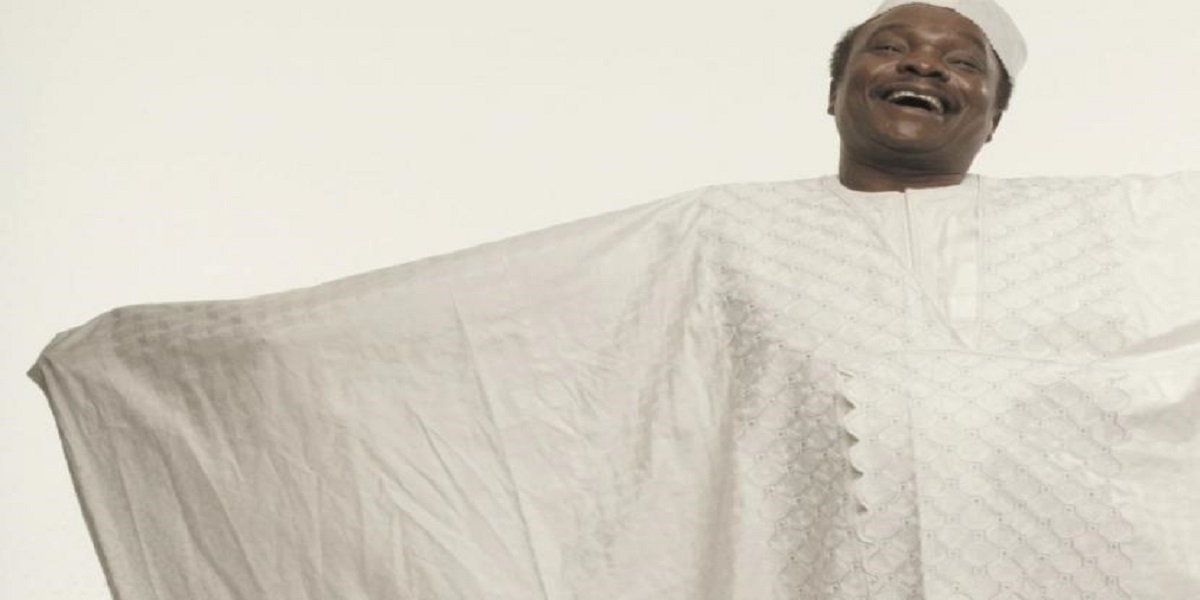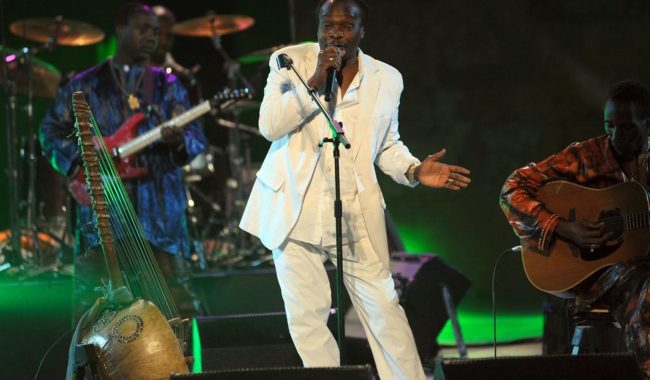
توفي أسطورة الموسيقى الأفريقية موري كانتيه، الذي أسهم في إكسابها شهرة عالمية، عن عمر ناهز 70 عاماً في عاصمة بلاده غينيا.
وشهدت مسيرة كانتيه الفنية الطويلة صعوداً من النطاق الإقليمي، كعازف لأداة الكورا التقليدية في غرب أفريقيا، نحو النجومية الدولية في ثمانينيات القرن الماضي، بأغنيته “ييكي ييكي” التي تصدرت قوائم الأغاني آنذاك.
وقال مدير أعماله جوان ريارت: “توفي موري الليلة الماضية، أثناء نومه، في العاصمة كوناكري”، مضيفاً أن سبب الوفاة غير معلوم.
وأوضح ريارت أن كانتيه كان يخطط لتقديم عدة حفلات خضعت كلها للتأجيل حتى العام المقبل نتيجة تفشي وباء فيروس كورونا المستجد.
وجاب كانتيه، الذي وُلد عام 1950، العالم كشعلة للموسيقى الأفريقية قبل أن يعود إلى بلده غينيا عام 2000، حيث دافع هناك عن قضايا مساعدة اللاجئين وإنقاذ الغابات المهددة، وفقا لسيرة ذاتية على موقعه على الإنترنت.
وواصل كانتيه عمله في صناعة الموسيقى، وشارك مع شخصيات موسيقية أفريقية مؤثرة في عام 2014 لعمل أغنية “أفريقيا أوقفوا الإيبولا”، لمواجهة ذلك الوباء الذي أودى بحياة أكثر من 11300 شخص.
ـــــــــــــــــــــــــــــــــــــــــــــــــــــــــــــــــــــــــــ

Mory Kanté
Jump to navigationJump to search
|
Mory Kanté
|
|
|---|---|
 |
|
| Background information | |
| Born | 29 March 1950 Albadaria, French Guinea[1][2] |
| Died | 22 May 2020 (aged 70) Conakry, Guinea |
| Genres | World music |
| Occupation(s) | Singer, songwriter |
| Instruments | Vocals, kora |
| Years active | 1971–2020 |
| Website | morykante.com |
Mory Kanté (29 March 1950 – 22 May 2020) was a Guinean vocalist and player of the kora harp. He was best known internationally for his 1987 hit song “Yé ké yé ké“, which reached number-one in Belgium, Finland, the Netherlands, and Spain. The album it came from, Akwaba Beach, was the best-selling African record of its time.[3]
Kanté was born in Albadaria, French Guinea (a part of French West Africa at the time) on 29 March 1950. His father was El Hadj Djeli Fodé Kanté and his mother, Fatouma Kamissoko, was a singer.[4] They were one of Guinea’s best known families of griot (hereditary) musicians.[5] He is of mixed Malian and Guinean descent.[4] After being brought up in the Mandinka griot tradition in Guinea, he was sent to Mali at the age of seven years – where he learned to play the kora, as well as important voice traditions, some of which are necessary to become a griot.[2] As a Muslim, he integrated aspects of Islamic music in his work.[3]
Career
In 1971 Kanté became a member of the Rail Band, in which Salif Keita was a singer.[2] Keïta left the band in 1973, leaving Kanté as the singer.[2]
In 1987, he released the song “Yé ké yé ké“, which was one of Africa’s best-ever selling hits as well as being a European number-one in 1988, making it the first ever African single to sell over one million copies.[6] The album it came from, Akwaba Beach, became the best-selling African record of its time. The album also featured an Islamic song, “Inch Allah”, alongside the pop hit “Yé ké yé ké”.[3] The album also featured the song “Tama”, which inspired two Indian Bollywood songs, “Tamma Tamma” in Thanedaar (1990) and “Jumma Chumma” in Hum (1991), the latter film also featuring another song “Ek Doosre Se” which was inspired by “Inch Allah”.[7]
Kanté received unexpected fame again in 1994 when the German techno duo Hardfloor created a dance remix of “Yéké Yéké.”[8][9] He also appeared in 2006 as vocalist on British DJ Darren Tate‘s release, “Narama”.[10]
On 16 October 2001, Kanté was nominated Goodwill Ambassador of the Food and Agriculture Organization of the United Nations (FAO). He participated in that year’s World Food Day ceremony at the FAO’s headquarters in Rome, alongside fellow singers Majida El Roumi, Gilberto Gil, and Albano Carrisi (who were also nominated as ambassadors).[11]
Kanté was among Africa’s top musicians – including Tiken Jah Fakoly, Amadou & Mariam and the rapper Didier Awadi – that banded together for the recording of “Africa Stop Ebola,” a song offering sound advice aimed at raising awareness in the wake of the Ebola crisis.[12] The song, released in November 2014, transcended public service announcements and sold 250,000 copies with all proceeds going to medical charity Medecins Sans Frontieres (MSF).[13]
Death
Kanté died on 22 May 2020 at a hospital in Conakry at the age of 70. He was suffering from chronic illnesses in the last years of his life and often received treatment in France. However, this was no longer possible due to the coronavirus pandemic in that country.[4][5]
Selected discography
Source:[14]
Albums
- Courougnegne (1981)
- N’Diarabi (1982)
- A Paris (1984)
- 10 Cola Nuts (1986)
- Akwaba Beach (1987) (#1 SUI; #13 GER; #43 SWE)
- Touma (1990)
- Nongo Village (1993)
- Tatebola (1996)
- Tamala – Le Voyageur (2001)
- Best Of (2002)
- Sabou (2004)
- La Guinéenne (2012)
- N’diarabi (2017)
Contributing artist
Singles
- “Yé ké yé ké” (1988) (#1 BEL; #1 NED; #1 ESP; #1 ISR; #2 GER; #2 SUI; #5 FRA; #10 AUT; #12 SWE; #29 UK)
- “Tama” (1988) (#44 GER)
- “Yéké Yéké” (remix) (1995) (#97 AUS,[15] #25 UK)
- “Yéké Yéké” (remix) (1996) (#28 UK)
ـــــــــــــــــــــــــــــــــــــــــــــــــــــــــــــــ
مورى كانتى
|
||||||||||||||||||||||||||||||||||||||||
|---|---|---|---|---|---|---|---|---|---|---|---|---|---|---|---|---|---|---|---|---|---|---|---|---|---|---|---|---|---|---|---|---|---|---|---|---|---|---|---|---|
مورى كانتى عازف مزيكا من مالى و جينيا.
حياته
مورى كانتى من مواليد يوم 29 مارس 1950 فى كيسيدوجو.
حياته الفنيه
كانت البدايه الفنيه سنه 1971.
مورى كانتى بيلعب كورا و بيقدم الانواع الفنيه:
جوايز
لينكات
- مورى كانتى – صور وتسجيلات صوتيه و مرئيه على ويكيميديا كومنز
- مورى كانتى معرف مخطط فريبيس للمعارف الحره
- مورى كانتى معرف النظام الجامعى للتوثيق
- 0000 7839 1057 مورى كانتى المعرف المعيارى الدولى للاسماء
- مورى كانتى معرف القاموس الوطنى لاسماء المؤلفين
- مورى كانتى معرف المكتبه الوطنيه الفرنسيه (BnF)
- مورى كانتى معرف بوب مونزينجر
- مورى كانتى معرف بيبسيس
- مورى كانتى معرف بيلبورد
- مورى كانتى معرف شبخ المكتبات فى سويسرا الجربيه
مصادر







